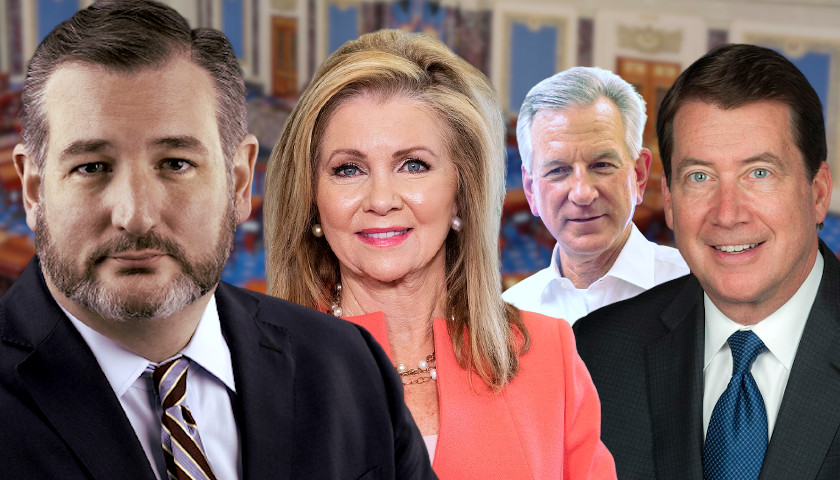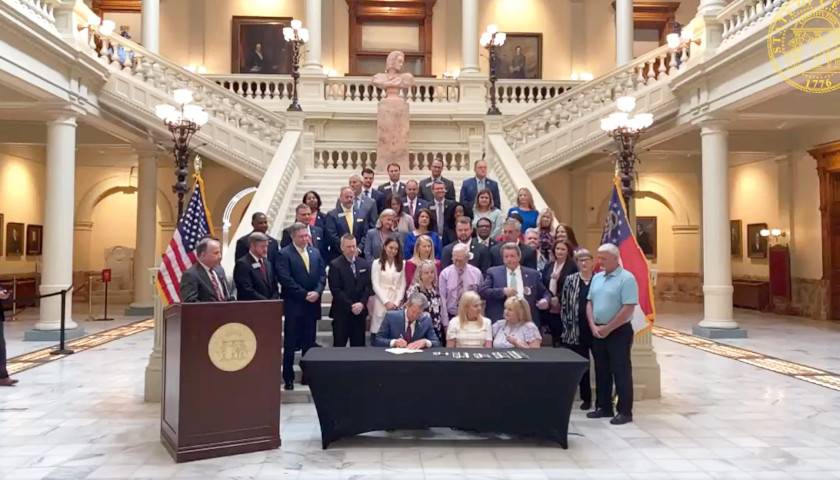Eleven more Republican U.S. senators and senators-elect from 10 states said they will contest the Electoral College results Wednesday over fraud concerns.
U.S. Senator Marsha Blackburn (R-TN), one of the 11, made the announcement Saturday. Senator-Elect Bill Hagerty (R-TN), who was endorsed by President Donald Trump in the election, is working with her in the dissent.
They join U.S. Sen. Josh Hawley (R-MO) and at least 140 Republican members of the House who previously said they plan to challenge the results.
Hagerty tweeted, “Senator @VoteMarsha and I will oppose the certification of the Electoral College results this week. It is our responsibility as your Senators to represent Tennessee’s values, and we intend to do just that.”
Senator @VoteMarsha and I will oppose the certification of the Electoral College results this week. It is our responsibility as your Senators to represent Tennessee's values, and we intend to do just that.
Read our full statement: https://t.co/TmdBOUc07Q
— Bill Hagerty (@BillHagertyTN) January 2, 2021
The senators and senators-elect said that in addition to disputing the Electoral College results, they will call for Congress to immediately appoint an Electoral Commission, with full investigatory and fact-finding authority, to conduct an emergency 10-day audit of the election returns in the disputed states.
The incumbent senators who will dispute the Electoral College results are:
- Senator Marsha Blackburn (R-TN)
- Senator Ted Cruz (R-TX)
- Senator Ron Johnson (R-WI)
- Senator John Kennedy (R-LA)
- Senator Mike Braun, (R-IN)
- Senator Steve Daines (R-MT)
- Senator James Lankford (R-OK)
The senators-elect are:
- Bill Hagerty (R-TN)
- Cynthia Lummis (R-WY)
- Tommy Tuberville (R-AL)
- Roger Marshall (R-KS)
Blackburn and Hagerty said in a joint statement, “On behalf of Tennesseans, we are taking a united stand against the tainted electoral results from the recent Presidential election. American democracy relies on the consent of the governed. Allegations of voter fraud, irregularities and unconstitutional actions diminish public confidence in what should be a free, fair and transparent process. Protecting the integrity of the electoral process is paramount to preserving trust and legitimacy in the final outcome.”
“For critical moments like these, the Constitution reserves the right to challenge the Electoral College results to members of Congress,” Blackburn and Hagerty said. “On January 6, we will vote to oppose certification of the 2020 election results.”
The group of 11 issued this joint statement:
America is a Republic whose leaders are chosen in democratic elections. Those elections, in turn, must comply with the Constitution and with federal and state law.
When the voters fairly decide an election, pursuant to the rule of law, the losing candidate should acknowledge and respect the legitimacy of that election. And, if the voters choose to elect a new office-holder, our Nation should have a peaceful transfer of power.
The election of 2020, like the election of 2016, was hard fought and, in many swing states, narrowly decided. The 2020 election, however, featured unprecedented allegations of voter fraud, violations and lax enforcement of election law, and other voting irregularities.
Voter fraud has posed a persistent challenge in our elections, although its breadth and scope are disputed. By any measure, the allegations of fraud and irregularities in the 2020 election exceed any in our lifetimes.
And those allegations are not believed just by one individual candidate. Instead, they are widespread. Reuters/Ipsos polling, tragically, shows that 39% of Americans believe ‘the election was rigged.’ That belief is held by Republicans (67%), Democrats (17%), and Independents (31%).
Some Members of Congress disagree with that assessment, as do many members of the media.
But, whether or not our elected officials or journalists believe it, that deep distrust of our democratic processes will not magically disappear. It should concern us all. And it poses an ongoing threat to the legitimacy of any subsequent administrations.
Ideally, the courts would have heard evidence and resolved these claims of serious election fraud. Twice, the Supreme Court had the opportunity to do so; twice, the Court declined.
On January 6, it is incumbent on Congress to vote on whether to certify the 2020 election results. That vote is the lone constitutional power remaining to consider and force resolution of the multiple allegations of serious voter fraud.
At that quadrennial joint session, there is long precedent of Democratic Members of Congress raising objections to presidential election results, as they did in 1969, 2001, 2005, and 2017. And, in both 1969 and 2005, a Democratic Senator joined with a Democratic House Member in forcing votes in both houses on whether to accept the presidential electors being challenged.
The most direct precedent on this question arose in 1877, following serious allegations of fraud and illegal conduct in the Hayes-Tilden presidential race. Specifically, the elections in three states —Florida, Louisiana, and South Carolina — were alleged to have been conducted illegally.
In 1877, Congress did not ignore those allegations, nor did the media simply dismiss those raising them as radicals trying to undermine democracy. Instead, Congress appointed an Electoral Commission—consisting of five Senators, five House Members, and five Supreme Court Justices—to consider and resolve the disputed returns.
We should follow that precedent. To wit, Congress should immediately appoint an Electoral Commission, with full investigatory and fact-finding authority, to conduct an emergency 10-day audit of the election returns in the disputed states. Once completed, individual states would evaluate the Commission’s findings and could convene a special legislative session to certify a change in their vote, if needed.
Accordingly, we intend to vote on January 6 to reject the electors from disputed states as not ‘regularly given’ and ‘lawfully certified’ (the statutory requisite), unless and until that emergency 10-day audit is completed.
We are not naïve. We fully expect most if not all Democrats, and perhaps more than a few Republicans, to vote otherwise. But support of election integrity should not be a partisan issue. A fair and credible audit — conducted expeditiously and completed well before January 20 — would dramatically improve Americans’ faith in our electoral process and would significantly enhance the legitimacy of whoever becomes our next President. We owe that to the People.
These are matters worthy of the Congress, and entrusted to us to defend. We do not take this action lightly. We are acting not to thwart the democratic process, but rather to protect it. And every one of us should act together to ensure that the election was lawfully conducted under the Constitution and to do everything we can to restore faith in our Democracy.
– – –
Jason M. Reynolds has more than 20 years’ experience as a journalist at outlets of all sizes.
Pictured left-to-right: Sen. Ted Cruz (R-TX), Sen. Marsha Blackburn (R-TN), Sen.-elect Tommy Tuberville (R-AL), and Sen.-elect Bill Hagerty (R-TN)






